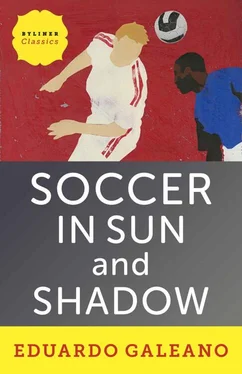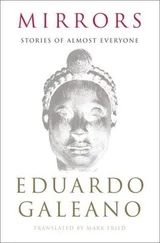When the Brazilian Friaça scored the first goal, the thunder of two hundred thousand voices and at least as many firecrackers shook the monumental stadium. But then Schiaffino rammed in the equalizer and a shot from the wing by Ghiggia gave Uruguay the championship with a 2–1 victory. When Ghiggia scored, the silence in Maracanã was deafening, the most raucous silence in the history of soccer, and Ary Barroso, the musician and composer of “Acuarela do Brasil,” who was providing commentary on the match for the entire country, swore off broadcasting for good.
After the final whistle, Brazilian commentators called the defeat “the worst tragedy in Brazil’s history.” Jules Rimet wandered about the field like a lost soul, hugging the cup that bore his name: “I found myself alone with the cup in my arms and not knowing what to do. I finally found Uruguay’s captain, Obdulio Varela, and I gave it to him practically without letting anyone else see. I held out my hand without saying a word.”
In his pocket, Rimet had a speech he had written to congratulate the victorious Brazilians.
Uruguay had won cleanly: they committed eleven fouls to the Brazilians’ twenty-one.
Third place went to Sweden, fourth to Spain. Brazil’s Ademir led the list of scorers with nine goals, followed by the Uruguayan Schiaffino and the Spaniard Zarra with five apiece.
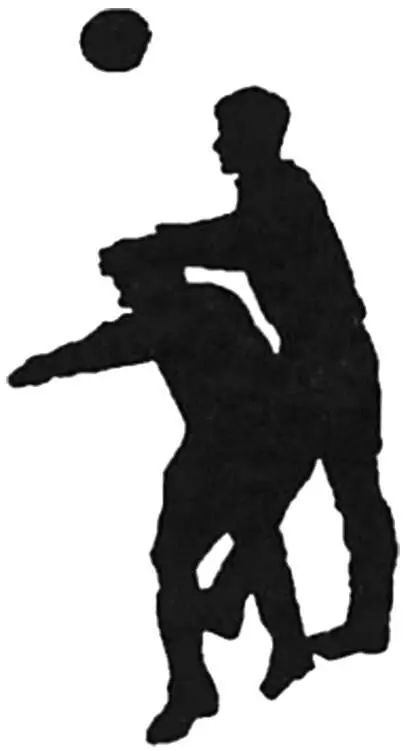
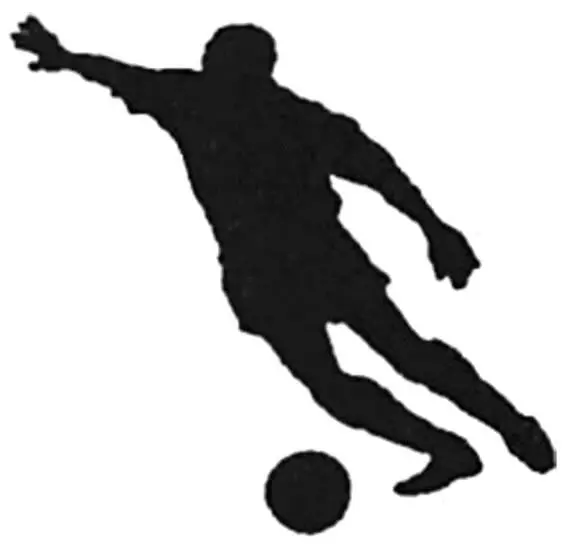
I was a little kid and a soccer fan, and like every other Uruguayan I was glued to the radio in 1950, listening to the World Cup final. When the voice of Carlos Solé broadcast the awful news of Brazil’s first goal, my heart sank to the floor. Then I turned to my most powerful friend. I promised God a heap of sacrifices if He would appear in Maracanã and turn the match around.
I never managed to remember my many promises, so I couldn’t keep them. Besides, although Uruguay’s victory before the largest crowd ever assembled for a soccer match was certainly a miracle, it was the work of a flesh-and-blood mortal named Obdulio Varela. Obdulio cooled the match down when the steamroller came at us, and then he carried the entire team on his shoulders. By sheer courage he fought against all the odds.
At the end of the day, reporters surrounded the hero. Obdulio didn’t stick out his chest or boast about being the best. “It was one of those things,” he murmured, shaking his head. And when they wanted to take his picture, he turned his back.
He spent that night drinking beer in one Rio bar after another, his arm around the defeated fans. The Brazilians cried. No one recognized him. The next day he dodged the crowd that had turned out to meet him at the Montevideo airport, where an enormous billboard had his name in lights. In the midst of all the euphoria, he slipped away, dressed like Humphrey Bogart in a raincoat with the lapels turned up and a fedora pulled down to his nose.
The top brass of Uruguayan soccer rewarded themselves with gold medals. They gave the players silver medals and some cash. Obdulio’s prize money was enough to buy a 1931 Ford. It was stolen a week later.
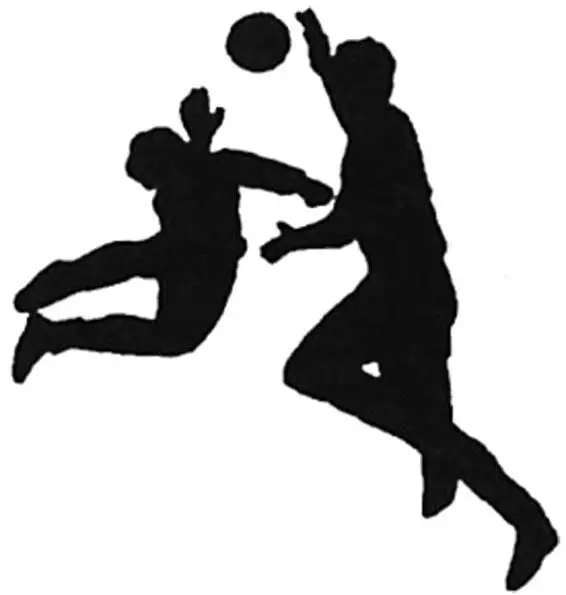
When it was time to select the best goalkeeper of the 1950 World Cup, journalists voted unanimously for the Brazilian Moacyr Barbosa. Without a doubt, Barbosa was the best keeper in the country, a man with springs in his legs whose calm self-assurance filled the entire team with confidence. He continued to be the best until he retired years later when he was in his forties. Over such a long career, who knows how many goals Barbosa blocked, and he never hurt a single striker.
But in that final match in 1950, the Uruguayan attacker Ghiggia surprised him with a bull’s-eye from the right wing. Barbosa, who had come forward, leaped back and his fingers grazed the ball as he fell. He got up convinced that he had knocked the shot away and found the ball in the back of the net. That was the goal that left Maracanã Stadium dumbstruck and crowned Uruguay as champions.
Years went by and Barbosa was never forgiven. In 1993, during the qualifiers for the World Cup in the United States, he wanted to wish the Brazilian players well. He went to visit them at their training camp and those in charge would not let him in. By then he was dependent on the generosity of his sister-in-law, living in her home with nothing but a miserable pension. Barbosa commented: “In Brazil, the most you can get for any crime is thirty years. For forty-three years I’ve been paying for a crime I did not commit.”
It was at the World Cup in 1950. Spain was all over England, which only managed to shoot from afar.
Gaínza, on the wing, gobbled up the left side of the field, left half the defense sprawled on the ground, and lobbed a cross toward the English goal. Ramsey the fullback was turned around, his back to the ball, off balance, yet he managed to reach it. Then Zarra stampeded in and rammed it home off the left post.
Telmo Zarra, leading scorer in six Spanish championships, had inherited the adulation formerly bestowed on Manolete, the bullfighter. He played on three legs, the third being his devastating head. His best-known goals were headers. In 1950 Zarra did not score that winning goal with his head, but he certainly used it to celebrate loudly, while squeezing the little medal of the Immaculate Virgin that hung on his chest.
Top Spanish soccer official Armando Muñoz Calero, who had taken part in the Nazi invasion of Russia, sent a radio message to Generalissimo Franco: “Excellency: we have vanquished the perfidious Albion.” Thus Spain finally got even for the defeat of the Invincible Armada in the waters of the English Channel in 1588.
Muñoz Calero dedicated the match “to the greatest Caudillo in the world.” He didn’t dedicate the next one to anyone. Spain faced Brazil and had to eat six goals.
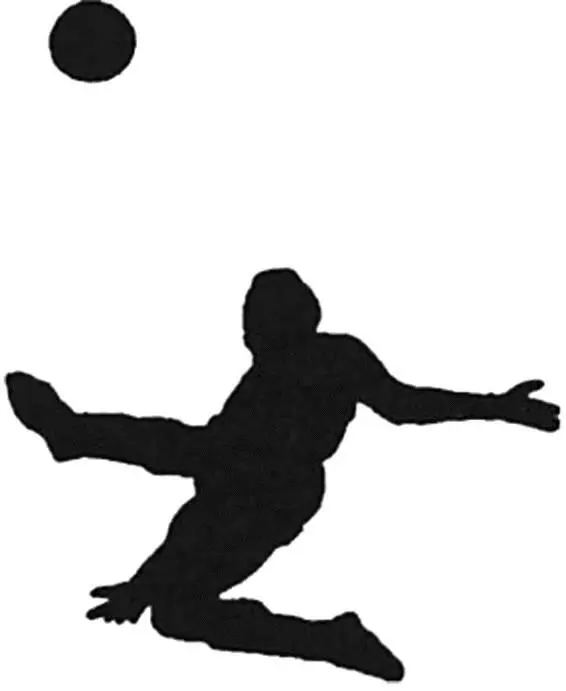
Again, it was at the World Cup in 1950. In the match against Yugoslavia, Brazil’s midfielder Zizinho scored a double goal.
This lord of soccer grace scored a clean goal and the referee disallowed it unfairly. So Zizinho repeated it step by step. He entered the box at the same spot, dribbled around the same Yugoslav defender with the same delicacy, slipping by on the left as before, and he drove the ball in at exactly the same angle. Then he kicked the ball angrily several times against the net.
The referee understood that Zizinho was capable of repeating that goal ten more times, and he had no choice but to allow it.
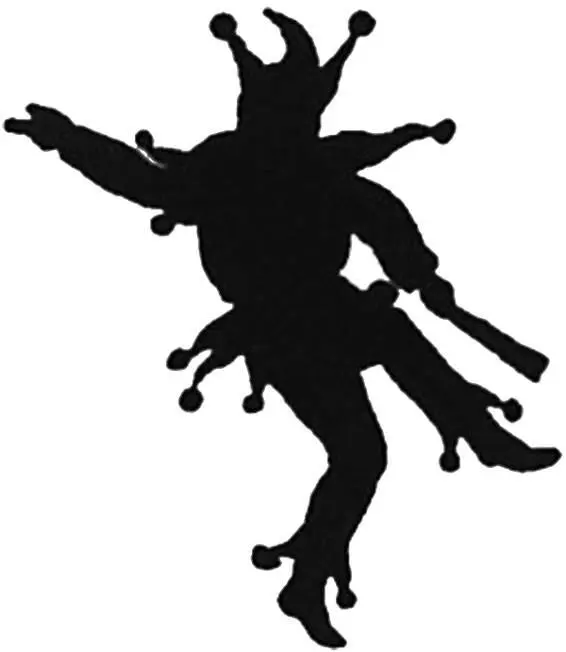
Julio Pérez, one of the Uruguayan champions from 1950, used to cheer me up when I was a child. They called him “Pataloca,” which means “Crazy Leg,” because he could take himself apart in the air and leave his adversaries rubbing their eyes. They couldn’t believe that his legs could fly one way while the rest of his body headed off in precisely the opposite direction. After eluding several opponents with such bodily taunts, he would back up and repeat the maneuver. In the stands we loved to cheer this party animal of the playing field, whose antics unleashed our laughter along with anything else that happened to be tied down.
Читать дальше
